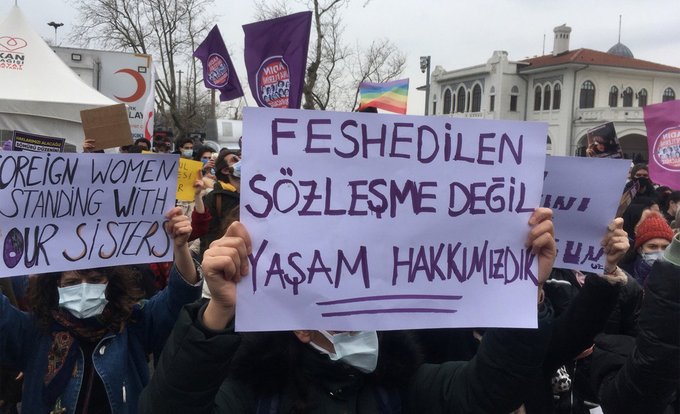

The Council of Europe will hold an online international meeting in Berlin on May 11 to mark the 10th anniversary of the signing of the Istanbul Convention against violence against women. Germany’s Minister for Family Affairs, Senior Citizens, Women and Youth, Franziska Giffey, hosts the meeting since Germany is the rotating chair of the Council. The Turkish government will not be represented at the meeting about the convention, although it was among its initiators, gaining an international reputation, with the key agreement taking its name from the city of Istanbul. In short, this is a loss in diplomatic terms, too. This meeting could have been held in Turkey if only President Recep Tayyip Erdoğan had not retreated from the Istanbul Convention, which he signed on behalf of Turkey ten years ago, due to pressure from Islamic cults and communities. At least it would be one of the main actors of the meeting. For example, Turkey’s Minister of Family and Social Services, Derya Yanık, was invited to make one of the opening speeches of the meeting and could tell about Turkey’s experience in preventing violence against women, regardless of how much this would mirror the truth. At least, she could say that Turkey enacted Law No. 6284 on the Protection of Family and Prevention of Violence Against Women, based on the Istanbul Convention, and that women and children are now more protected against men’s violence – yet only compared to conditions before the law.
Dreams of modern civilization
In reality, newly appointed Minister Yanık had supported Turkey’s retreat from the agreement as the director of an association named Women and Democracy (KADEM). Probably, she was promoted as the minister because of her performance at KADEM, whose vice-president is Sümeyye Erdoğan Bayraktar, the daughter of President Erdoğan.
In fact, KADEM has played a role in delaying the influence of Islamic cults, communities and lobbies that pressured Erdoğan to withdraw from the Istanbul Convention. Erdoğan Bayraktar’s positive contribution to the issue is known. However, it is also a fact that KADEM supported the decision to retread from the convention in March 2021. This is not a step for the benefit of women or toward democracy.
The circles that made Turkey exit from the Istanbul Convention by blackmailing the ruling Justice and Development Party (AKP) by threatening it over ballots now target the Law 6284. What they really target is the Civil Code, which judicially sees men and women equal.
The exit from the Istanbul Convention not only caused a serious regression in women’s struggle for safety, rights or gender equality, but also dealt a heavy blow to the AKP governments’ claim to be a “soft power” in foreign policy. With the retreat from the convention that was accepted ten years ago – with the efforts of Foreign Minister of Foreign Affairs Mevlüt Çavuşoğlu, who was the President of the Parliamentary Assembly of the Council of Europe at that time – is also a hit on the goal of Mustafa Kemal Atatürk, the founder of the Turkish Republic, to reach the “level of contemporary civilizations.”
Government will be absent but Turkey will be there
Although no one is invited to represent the Turkish government at the online Germany meeting, there will important names from Turkey present. For example, Dr. Feride Acar is one of the two speakers in the first panel after the opening. as the Turkey representative of GREVIO, which was created to monitor and report the implementation of the convention.
Author Elif Şafak will also speak before the closing panel. The message is clear: The fact that the Turkish government voluntarily left the Istanbul Convention dealing with violence against women did not prevent the Council of Europe from including Turkey to the event. The invitees will explain the situation in Turkey. The Council of Europe also invited Prof. Aşkın Asan to the conference, but as a listener. Aşkın Asan actively struggled against Turkey’s retreat from the convention and therefore she was targeted by the conservative segment inside the AKP. She is still considered in the community because her attitude is different.
In other words, regardless of the government’s propaganda, those interested in Turkey are watching and seeing very well what is happening and who is who. The government propaganda that claims that the move did not undermine women’s rights, and violence against women has not increased do not change a thing. Those who follow Turkey are aware that the country is not limited to Erdoğan’s will.
Main opposition Republican People’s Party (CHP) leader Kemal Kılıçdroğlu has said warned those would finance Kanal İstanbul, a giant government project to connect the Black Sea and the Marmara Sea with an artificial water canal as an alternative to Bosphorus. He said they won’t get their money back if the CHP comes to power.
I wonder if Kılıçdaroğlu and his election ally, İYİ Party (Good Party) leader, would also say that “When we are in power, we will reapply to the Istanbul Convention?”


